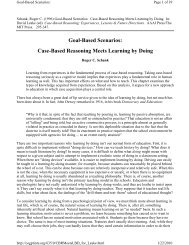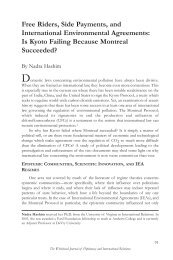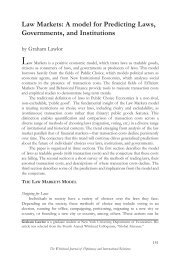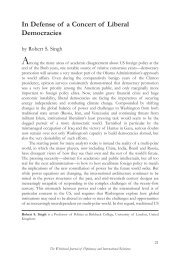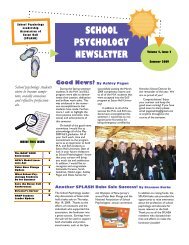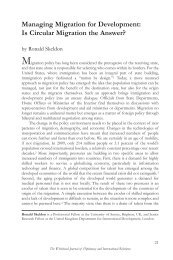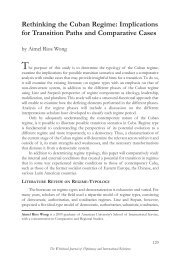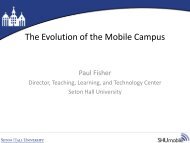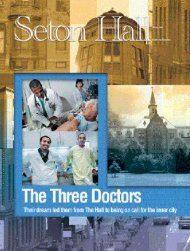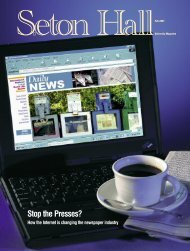Seton Hall Magazine, Winter 2003 - Seton Hall University
Seton Hall Magazine, Winter 2003 - Seton Hall University
Seton Hall Magazine, Winter 2003 - Seton Hall University
You also want an ePaper? Increase the reach of your titles
YUMPU automatically turns print PDFs into web optimized ePapers that Google loves.
When temperatures dipped below zero, as they often did, Father Hamel<br />
was especially thankful for his wool hat while serving at Camp<br />
Stronghold Freedom in Karshi-Khanabad, Uzbekistan.<br />
Air Base. Although he clearly recognized the possibility of danger,<br />
he also felt a sense of excitement when he learned of his assignment.<br />
“Being deployed is a great ministry, a chance for me to<br />
really make a difference in the lives of those who are dutifully<br />
serving our country,” he says.<br />
Upon arrival, Father Hamel helped set up a tent city for the<br />
soldiers as part of the base’s expansion. “There are tents that serve<br />
as the living quarters, mess hall, latrines, showers, even a movie<br />
theater and chapel,” he explains. Although such living conditions<br />
are primitive at best, certain technologies added a modern feel to<br />
the temporary town: “The tents are equipped with electricity,<br />
some even have Internet connections,” Father Hamel says.<br />
It wasn’t long before he was sent out from the base to the front<br />
lines in Uzbekistan, the first Catholic priest to be deployed there.<br />
Camp Stronghold Freedom is located in Karshi-Khanabad, a former<br />
Taliban stronghold that became a logistics hub for the U.S.<br />
airstrikes in Afghanistan. Father Hamel was overwhelmed by the<br />
warm welcome he received from the troops. “They were so grateful<br />
to have a Catholic priest in their midst,” he recalls.<br />
Despite being away from friends, family and the comforts of<br />
home, the troops remained positive, according to Father Hamel.<br />
A military tent served as the base’s chapel in Qatar. The inside view<br />
shows the chapel’s sparse but functional furnishings.<br />
“I was impressed by the extent to which they were focused and<br />
dedicated to accomplishing the mission,” he remembers. “Spirits<br />
were high despite the threat of war and constant danger.”<br />
Perhaps most impressive to Father Hamel was their steadfast<br />
faith. “The simplicity and genuineness of their faith was so touching,”<br />
he recalls. “The young troops were so grateful and patiently<br />
waited to talk to me.” He remembers watching with great joy as<br />
the troops came to Mass and later lined up to receive the<br />
Sacrament of Reconciliation.<br />
Another heartwarming moment occurred during a Christmas<br />
party. The organizers had invited an Uzbek soldier and his 6-yearold<br />
son. “After saying grace, the son and the father were the first<br />
two people in line for food,” Father Hamel says. “Although the<br />
spread was certainly not fancy — it was your typical mess hall fare<br />
— they were so thankful to have been included in our celebration.”<br />
A few days later, while awaiting transport back to Qatar after<br />
his service on the front lines, Father Hamel met with Monsignor<br />
Sheeran in Germany. “It was a great comfort to see a familiar face<br />
from South Orange while serving overseas,” he remembers. “I was<br />
immediately reminded of the guidance and support he had given<br />
me so many years before. That strengthened me.”<br />
After returning to Grand Forks for a brief period, Father<br />
Hamel was reassigned to Osan Air Base in South Korea. He is<br />
pastor to the hundreds of Catholics who are stationed there, and<br />
also serves as a chaplain to the broader community on the base.<br />
He and his parishioners offer a social outreach program to a<br />
Korean orphanage and retirement home, and also are helping<br />
build a Catholic church in a nearby mountain village. “Being<br />
deployed is certainly a challenge. You must learn to adapt to<br />
working with new people under new conditions and in an unfamiliar<br />
environment,” he says, “but I feel honored and privileged<br />
to serve God — and my country — in this special way.”<br />
— Carol Stavraka<br />
WINTER <strong>2003</strong> 31




